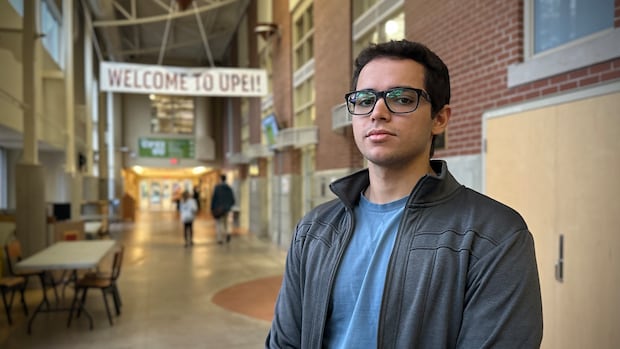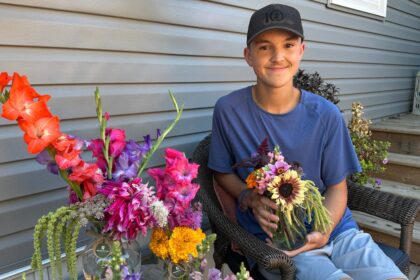When University of Prince Edward Island student Lian Camargo left Brazil to study on P.E.I., he thought he had found an affordable place to earn his degree.But just two years into his program, the business student now finds himself juggling three jobs — two on campus and one off — while trying to keep up with his classes.“It’s really hard when you want to focus on your academic life, but also you are too worried with working and getting enough money to just live here,” Camargo told Island Morning host Mitch Cormier during CBC’s remote broadcast from the UPEI campus on Thursday.“I do study a lot, and I usually study during, like morning. I go to sleep like two, three a.m. to wake up at seven and start my work. So it’s really a tough position to be in, but I don’t really know what to do.”LISTEN | President of UPEI aims for trust and transparency:Island Morning12:13President of UPEI aims for trust and transparencyWendy Rodgers took over the presidency of UPEI during a time of upheaval and mistrust. We speak with her about the efforts to restore that trust and a commitment to transparency. Camargo’s struggle is shared by many at UPEI, and it reflects broader challenges facing both students and the university itself.As affordability concerns grow and tuition continues to rise, UPEI is contending with its own financial pressures, shaped in part by recent federal policies that have reduced international enrollment. Amid these challenges, students and staff alike are finding ways to adapt.‘Students really are struggling’Luciana Quiroa Paredes, president and CEO of the UPEI Student Union, said the affordability crisis touches every part of student life.“Students really are struggling… not just affording tuition or fees, it’s also textbooks, rent, groceries and all of that. It’s really taking a toll on students,” said Paredes, who is originally from Peru.Many students are struggling to afford essential costs like tuition, textbooks and rent, UPEI Student Union president Luciana Quiroa Paredes told Island Morning host Mitch Cormier during CBC’s remote broadcast from the Fox and Crow Pub on campus. (Thinh Nguyen/CBC)The student union has been advocating for measures to ease that strain.Their efforts helped launch the open education resource development program, which provides faculty with grants to create or adapt open textbooks and course materials. The program has reopened this year, with around 10 applications already received, Paredes said.The union also runs initiatives like Free Food Fridays, a program supported by local businesses to help address food insecurity among students.For international students like Sushil Khatri, co-president of the UPEI Nepalese Society, the pressure is even sharper.With international tuition up 7.5 per cent this school year — higher than the 6.5 per cent for Canadian students — and following a five per cent hike across the board last year, many of his peers are struggling to keep up.Khatri said many have had to cut corners on meals or take on extra work, all while maintaining their grades.“It’s been really tough being an international student here on P.E.I.,” Khatri said.University faces financial strain tooThe tuition increases, while difficult for students, are a measure UPEI says it needed to take.The university itself is facing financial constraints amid falling international enrolments — a trend seen across the country after the federal government introduced a cap on international student visas in early 2024.’Federal legislation has affected us, and we’ve had to respond really, really quickly,’ says Wendy Rodgers, UPEI’s president and vice-chancellor. (Thinh Nguyen/CBC)Wendy Rodgers, UPEI’s president and vice-chancellor, said the biggest challenges in her role, which she has held for less than a year and a half, come from outside the university.“Federal legislation has affected us, and we’ve had to respond really, really quickly,” Rodgers said.One of those responses has been tuition hikes to offset an estimated $3-million shortfall this fiscal year, with another $3 million projected next year.LISTEN | International student groups share ups and downs of their UPEI experiences:Island Morning7:38International student groups share ups and downs of their UPEI experiencesWe hear from two international students about what brought them to P.E.I. and what some of the challenges are when it comes to making a life on the Island.The university is also tightening spending through measures such as vacancy management — strategically reviewing positions that become open through retirements or staff departures.”How can we use that position to achieve our mission? Or do we not need that position? In which case, then we can cut that from our budget without actually having as deep a human impact as if somebody was occupying it,” she said.Despite the financial pressures, Rodgers said UPEI remains focused on its students, especially helping them prepare for an uncertain job market.She said the university has been strengthening partnerships with Holland College, as more university graduates pursue short-term college credentials to boost employability.Growth amid the challengesDespite the difficulties, some areas at UPEI are seeing growth. One of the most notable is in Indigenous studies.Since the university began requiring all students to take IKE 1040: Indigenous Teachings of Turtle Island, the faculty of Indigenous knowledge, education, research and applied studies has seen soaring interest.“It’s absolutely amazing,” said instructor David Varis.“They learn concepts of relationality, caring for the environment. They understand Indigenous peoples or… Canada’s very troubled history. So now we’re trying to reconcile that, and students are on top of it and just enjoying it so much.”David Varis, an instructor with UPEI’s faculty of Indigenous knowledge, education, research and applied studies, has noticed increasing student interest in Indigenous Studies. (Thinh Nguyen/CBC)Varis said the number of students declaring an Indigenous Studies minor has grown from fewer than 20 in the program’s early days to more than 50 this year.Students like Grace McQuaid, a fourth-year Diversity and Social Justice major minoring in Indigenous studies, said the experience has been eye-opening.“It was after taking the mandatory 1040 course where I realized just how little I knew about the land that I live on and the people that have lived here for thousands of years,” McQuaid said.“And it’s through that that I’ve learned my responsibility as a non-Indigenous ally to continue learning, and UPEI is exceptional to offer these courses for those students, and students like myself can continue learning about our land.”French education program sees renewed interestAnother bright spot is UPEI’s French second-language bachelor of education, a post-degree, one-year program designed to train French teachers in a province — and country — where demand outpaces supply.Earlier this year, CBC News reported the program was only about half-full.Since then, Elizabeth Blake, the program’s co-ordinator and an assistant professor, said enrolment has nearly doubled, attracting students from across Canada.Elizabeth Blake says strong job prospects are drawing students to the French second-language bachelor of education program, as the shortage of French teachers means they’re likely to secure a position soon after graduation. (Thinh Nguyen/CBC)“We went from 18 last year to 32 this year,” Blake said. “We have a huge influx in northern Ontario folks.”Blake said the biggest draw of the program is the strong job prospects. Because of the shortage of French teachers, students are likely to secure a position soon after graduation. The program condenses two years of study into one, running from May to May.“That’s the huge push or draw for our program,” she said. “It is intensive, but after the year’s up, you get a teaching certificate and a diploma.”
From affordability woes to federal policy shifts, UPEI community adapts to changing times










